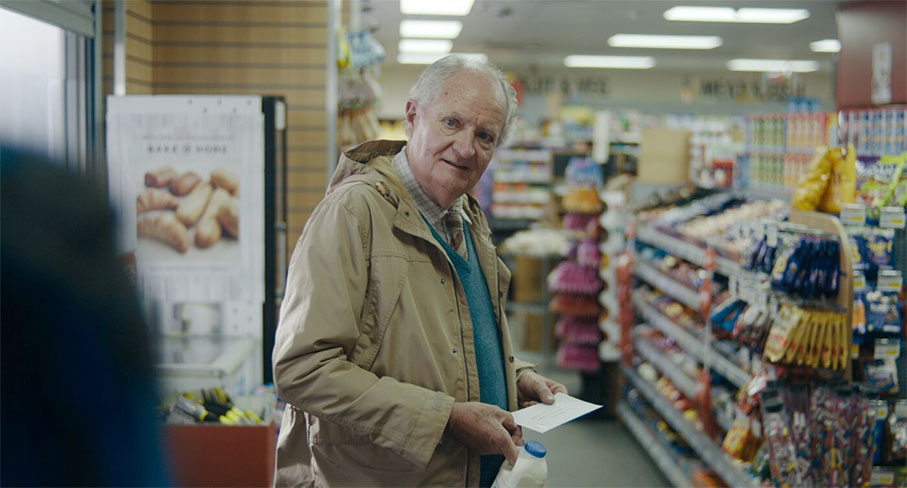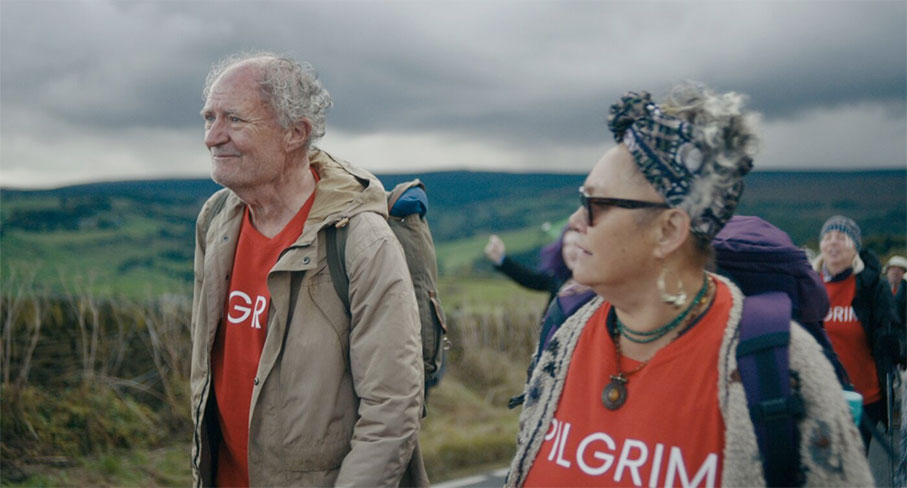| |
“I find Harold's journey across England and his belief that he can make a difference extraordinarily moving and inspiring. I am enormously excited to be working with Jim Broadbent, who I know will use his warmth, range and sensitivity to create an onscreen Harold who will lodge deep in the hearts of everyone who sees it.” |
| |
Director Hettie Macdonald* |
A Brief Personal Note: I have been reviewing films and discs for this site since 2003. This year is our (regrettably uncelebrated) 20th Anniversary! Wow. To quote Harold Fry, “Who knew?” But for the past few months I have been working very long hours on two extraordinary films and have had so few moments of spare time to pen reviews of films and TV that I have had simply no time to see. Last weekend, I was determined to support my local cinema, where I have been entertained with impeccable service and enthusiasm since 1995. Harold Fry is a lovely, gentle film and a great way to get back in the reviewing saddle.
Harold Fry is an Englishman, a closed down, emotionally stunted and event-buffeted Englishman - a national stereotype of sorts – who has lacked (as we all might lack one day) the ability to process the most profound emotional damage and emerge at the other end broken but unbowed. His marriage stutters along monosyllabically and his long suffering wife has a few skeletons in her own cupboard that are firmly repressed and locked away. In this dreary Devonshire suburban environment, Harold receives word that an old friend is dying in a hospice in Berwick-upon-Tweed just a few miles shy of the Scottish border and almost five hundred miles away from his home. He pens a reply, clearly one very difficult to write and subsequently utterly inadequate. Then, after a short but inspirational conversation with a garage attendant on the way to the post box, Harold is gripped with a sense of purpose and starts to walk to his old friend in Berwick with no forethought or preparation, embarking on a ludicrous pilgrimage believing his commitment and actions will stay his friend’s cancer long enough for him to comfort her. He leaves behind a wife stifled by her marriage but unable to function without her husband being there despite his less than stellar adherence to a union that long ago became just two people defined by a shared tragedy. Along the way, Harold picks up a bit of fame via a journalist he shares a beer with and is briefly heralded as some sort of authentic role model for New Age thinkers. Most of the people he interacts with are psychologically missing parts of themselves which Harold, in his earthy and simple manner, manages to evoke.

As Harold starts his pilgrimage, he stops for a moment and looks at the sublime view of the rolling countryside. You get the impression his entire world has been relegated to hoovers, cups of tea and the faintest and despondently ephemeral interactions with his wife. The first time Harold responds to the beauty of the landscape, presumably just up the road from him, he utters with no little awe “Who knew?” This short moment allows the film to lay out its intentions. This is a story about the savouring of simple life experiences and how those small acts of observance, if not healing someone completely, can certainly be a balm for the soul. Here is a man still traumatised by tragedy but in his pilgrimage, he allows parts of his granite grief overcoat to slowly be chipped away. This reminded me of a sublime piece of direction from director Ang Lee to actor Alan Rickman in Sense and Sensibility. He said that his character Colonel Brandon had been emotionally frozen and the gradual thawing out process was as painful as it was necessary. Or words to that effect.
At a time when the woes of the world seem almost insurmountable, it’s encouraging to find a film (based closely on the Booker nominated book of the same title written by Rachel Joyce) that celebrates the goodness in (I hope) most of us. Joyce was coincidentally once an actress and who co-starred with a certain Jim Broadbent in their respective early years performing Shakespeare on stage. Connections, connections… Harold’s wife urges him from the sidelines to find the good in people after giving in to her husband’s odd behaviour and his pilgrimage develops into one of stirring hope the nearer he gets to the hospice. I loved the way simple ‘real’ issues are dealt with, with absolutely no fanfare. An older man who has never walked any great distance (“to the car and back,” says his wife) doesn’t get too far in his loafers until his feet blister and bleed and flatly give up on him. He is taken in by a Slovakian doctor, Martina, an immigrant unable to practise in this country despite being evidently qualified. Martina, played beautifully by Monika Gossman, is also suffering quietly being forced to work as a cleaner and lamenting a broken relationship, one never to be healed. Harold allows her to connect with another human being in a very supportive way and even though she has scant screen time, it’s an important interaction. Martina is the very template of human goodness, many examples of which Harold will encounter in his travels.
Let’s briefly talk about this film’s primary strength – its astonishing performances. How much an actor’s performance is based on their relationship with and cues from the director is a subject for another article but what’s hardly ever taken into consideration when it comes to making any judgement on acting is how much of it was drawn out by the director and how much of it was initiated by the actors themselves. So, to director Hettie Macdonald, I say that whatever you did to get these extraordinary performances on to the screen, bravo. Jim Broadbent has been somewhat typecast over the years as the dotty but benevolent middle aged and older man but he’s instantly memorable because he has an authentic charisma which is something they cannot teach you at RADA (or as an 80s radio comedy once dubbed it, ‘The Royal Academy of Doing Acting’). Even washing himself in a stream and sleeping under the stars are things to relish as experiences well worth having after the stunted sterility of suburban life. It’s the prefix ‘sub’ usually meaning ‘below’ that renders ordinary domestic experiences as anaesthetically numbing. Harold needed a dose of honest, authentic reality and its sometimes literal cleansing effects. His wife Maureen, whose life has also been up-ended by the same tragedy, is superbly played by Penelope Wilton. The actress makes you feel every slight, every dark surprise her husband unwittingly heaps upon her. Wilton has been a staple in UK TV and film for many years notably from my perspective as the redeemed PM of the UK in the David Tennant era Doctor Who and as Anne, Ricky Gervais’ bench mate at the graveyard in After Life. She is utterly convincing as the put upon wife who just wants her husband home again. She also is hiding a small but significant part in her husband’s suffering but that’s for you to find out about.

Yes, thematically the film has echoes of David Lynch’s sublime The Straight Story with parallel attendant tragedies revealed along the way (minus the lawnmower of course). But Harold Fry ploughs its own furrow and its innate Britishness is, for once, a strength not a cultural ingredient to be mocked and derided. There is another film it has strong ties to. Living, with lead actor Bill Nighy, posits a similar scenario about a man coming to terms with what life can actually offer even in the face of imminent death. Harold isn’t dying per se. He’s been dead for quite a while. His pilgrimage allows him to awaken, to shrug off death, to accept things he cannot change or go back and alter. Acceptance may conjure up helplessness in the face of insurmountable trauma but in this context, it is a uniquely powerful epiphany.
Accepting what is allows Harold to seize control of a numbed life and force some animation and agency back into it. We do not leave Harold and Maureen about to engage in a faux Hollywood happy ending but we do leave them emotionally richer than they have been for decades. Do you think the novel’s author ever considered the name Maude for her protagonist’s wife? Just thinking aloud. Some famous film director** once said that movies don’t change the world but once in a while a film comes along that invites you to look at that world in a different and more progressive way. Bravo Harold.
|